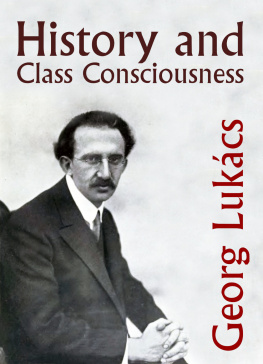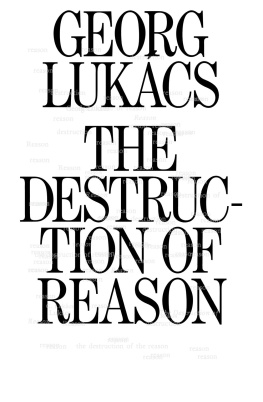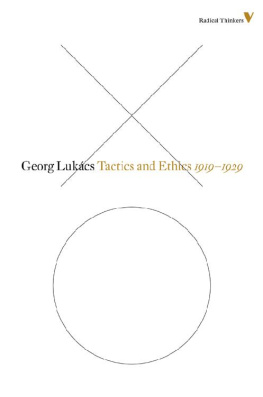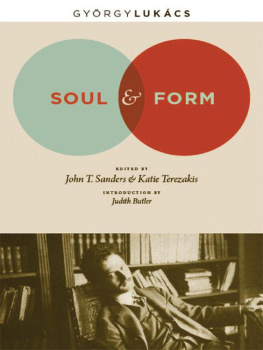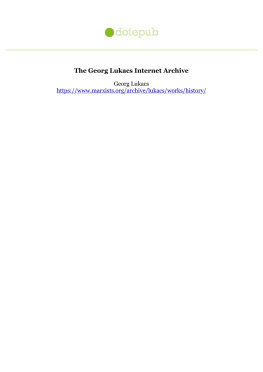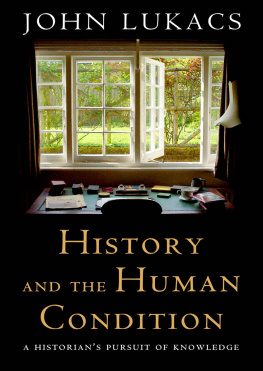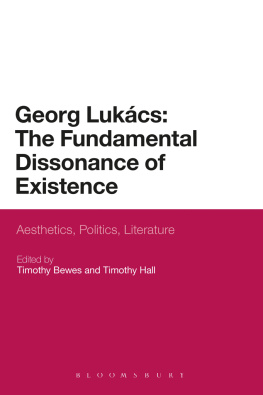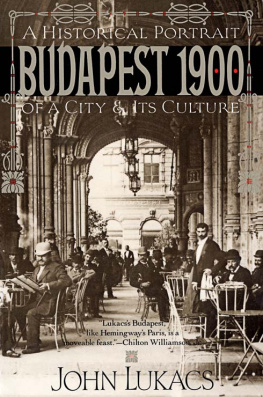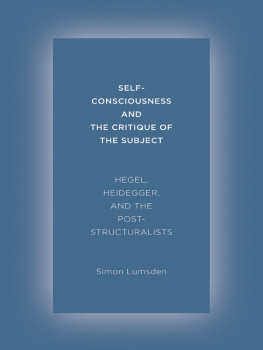Georg Lukács - History and Class Consciousness
Here you can read online Georg Lukács - History and Class Consciousness full text of the book (entire story) in english for free. Download pdf and epub, get meaning, cover and reviews about this ebook. publisher: Marxist Internet Archive, genre: Religion. Description of the work, (preface) as well as reviews are available. Best literature library LitArk.com created for fans of good reading and offers a wide selection of genres:
Romance novel
Science fiction
Adventure
Detective
Science
History
Home and family
Prose
Art
Politics
Computer
Non-fiction
Religion
Business
Children
Humor
Choose a favorite category and find really read worthwhile books. Enjoy immersion in the world of imagination, feel the emotions of the characters or learn something new for yourself, make an fascinating discovery.
- Book:History and Class Consciousness
- Author:
- Publisher:Marxist Internet Archive
- Genre:
- Rating:5 / 5
- Favourites:Add to favourites
- Your mark:
- 100
- 1
- 2
- 3
- 4
- 5
History and Class Consciousness: summary, description and annotation
We offer to read an annotation, description, summary or preface (depends on what the author of the book "History and Class Consciousness" wrote himself). If you haven't found the necessary information about the book — write in the comments, we will try to find it.
History and Class Consciousness — read online for free the complete book (whole text) full work
Below is the text of the book, divided by pages. System saving the place of the last page read, allows you to conveniently read the book "History and Class Consciousness" online for free, without having to search again every time where you left off. Put a bookmark, and you can go to the page where you finished reading at any time.
Font size:
Interval:
Bookmark:
Written : 1919-1923;
Source : History & Class Consciousness;
Translator : Rodney Livingstone;
Publisher : Merlin Press, 1967;
Transcription and HTML Mark-up : Andy Blunden.
Preface (December 1922)
What is Orthodox Marxism? (March 1919)
The Marxism of Rosa Luxemburg (Jan 1921)
Class Consciousness (March 1920)
Reification and the Consciousness of the Proletariat (1923)
I: The Phenomenon of Reification
II: Antinomies of Bourgeois Thought
Subject & Object In Hegel
III: The Standpoint of the Proletariat
The Changing Function of Historical Materialism
Legality and Illegality (July 1920)
Critical Observations on Rosa Luxemburgs Critique of the Russian Revolution (Jan 1922)
Towards a Methodology of the Problem of Organisation (Sep 1922)
Philosophy | Lukacs Archive
Conversion in progress
Georg Lukcs 1923
THE collection and publication of these essays in book form is not intended to give them a greater importance as a whole than would be due to each individually. For the most part they are attempts, arising out of actual work for the party, to clarify the theoretical problems of the revolutionary movement in the mind ,of the author and his readers. The exceptions to this are the two essays Reification and the Consciousness of the Proletariat and Towards a Methodology of the Problem of Organisation which were both written specially for this collection during a period of enforced leisure. They, too, are based on already existing occasional pieces.
Although they have now been partly revised, no systematic attempt has been made. to remove the traces of the particular circumstances in which they were written. In some cases a radical recasting of an essay would have meant destroying what I regard as its inner core of truth. Thus in the essay on The Changing Function of Historical Materialism we can still hear the echoes of those exaggeratedly sanguine hopes that many of us cherished concerning the duration and tempo of the revolution. The reader should not, therefore, look to these essays for a complete scientific system.
Despite this the book does have a definite unity. This will be found in the sequence of the essays, which for this reason are best read in the order proposed. However, it would perhaps be advisable for readers unversed in philosophy to put off the chapter on reification to the very end.
A few words of explanation superfluous for many readers perhaps are due for the prominence given in these pages to the presentation, interpretation and, discussion of the theories of Rosa Luxemburg. On this point I would say, firstly, that Rosa Luxemburg, alone among Marxs disciples, has made a real advance on his lifes work in both the content and method of his economic doctrines. She alone has found a way to apply them concretely to the present state of social development. Of course, in these pages, in pursuance of the task we have set ourselves, it is the methodological aspect of these questions that will be most heavily stressed. There will be no assessment of the economic content of the theory of accumulation, nor of Marxs economic theories as such: we shall confine our discussion to their methodological premises and implications. It will in any case be obvious to the reader that the present writer upholds the validity of their content. Secondly, a detailed analysis of Rosa Luxemburgs thought is necessary because its seminal discoveries no less than its errors have had a decisive influence on the theories of Marxists outside Russia, above all in Germany. To some extent this influence persists to this day. For anyone whose interest was first aroused by these problems a truly revolutionary, Communist and Marxist position can be acquired only through a critical confrontation with the theoretical lifes, work of Rosa Luxemburg.
Once we take this path we discover that the writings and speeches of Lenin become crucial, methodologically speaking. It is not our intention to concern ourselves here with Lenins political achievements. But just because our task is consciously one-sided and limited it is essential that we remind ourselves constantly of Lenins importance as a theoretician for the development of Marxism. This has been obscured for many people by his overwhelming impact as a politician. The immediate practical importance of each of his utterances for the particular moment in which they are made is always so great as to blind some people to the fact that, in the last resort, he is only so effective in practice because of his greatness, profundity and fertility as a theoretician. His effectiveness rests on the fact that he has developed the practical essence of Marxism to a pitch of clarity and concreteness never before achieved. He has rescued this aspect of Marxism from an almost total oblivion and by virtue of this theoretical action he has once again placed in our hands the key to a right understanding of Marxist method.
For it is our task and this is the fundamental conviction underlying this book to understand the essence of Marxs method and to apply it correctly. In no sense do we aspire to improve on it. If on a number of occasions certain statements of Engels are made the object of a polemical attack this has been done, as every perceptive reader will observe, in the spirit of the system as a whole. On these particular points the author believes, rightly or wrongly, that he is defending orthodox Marxism against Engels himself.
We adhere to Marxs doctrines, then, without making any attempt to diverge from them, to improve or correct them. The goal of these arguments is an interpretation, an exposition of Marxs theory as Marx understood it. But this orthodoxy does not in the least strive to preserve what Mr. von Struve calls the aesthetic integrity of Marxs system. On the contrary, our underlying premise here is the belief that in Marxs theory and method the true method by which to understand society and history has finally been discovered. This method is historical through and through. It is self-evident, therefore, that it must be constantly applied to itself, and this is one of the focal points of these essays. At the same time this entails taking up a substantive position with regard to the urgent problems of the present; for according to this view of Marxist method its pre-eminent aim is knowledge of the present. Our preoccupation with methodology in these essays has left little space for an analysis of the concrete problems of the present. For this reason the author would like to take this opportunity to state unequivocally that in his view the experiences of the years of revolution have provided a magnificent confirmation of all the essential aspects of orthodox (i.e. Communist) Marxism. The war, the crisis and the Revolution, not excluding the so-called slower tempo in the development of the Revolution and the new economic policy of Soviet Russia have not thrown up a single problem that cannot be solved by the dialectical method and by that method alone. The concrete answers to particular practical problems lie outside the framework of these essays. The task they propose is to make us aware of Marxist method, to throw light on it as an unendingly fertile source of solutions to otherwise intractable dilemmas.
This is also the purpose of the copious quotations from the works of Marx and Engels. Some readers may indeed find them all too plentiful. But every quotation is also an interpretation. And it seems to the present writer that many very relevant aspects of the Marxist method have been unduly neglected, above all those which are indispensable for understanding the coherent structure of that method from the point of view Of logic as well as content. As a consequence it has become difficult, if not almost impossible, to understand the life nerve of that method, namely the dialectic.
Font size:
Interval:
Bookmark:
Similar books «History and Class Consciousness»
Look at similar books to History and Class Consciousness. We have selected literature similar in name and meaning in the hope of providing readers with more options to find new, interesting, not yet read works.
Discussion, reviews of the book History and Class Consciousness and just readers' own opinions. Leave your comments, write what you think about the work, its meaning or the main characters. Specify what exactly you liked and what you didn't like, and why you think so.

